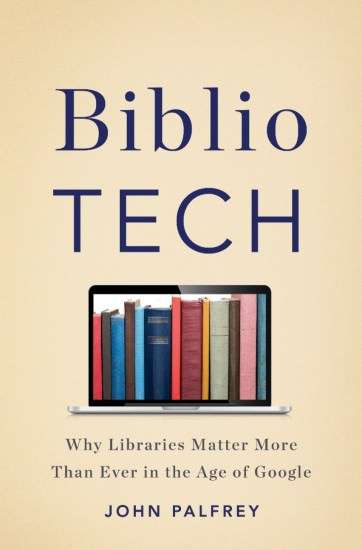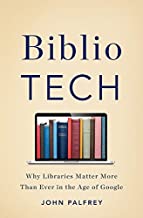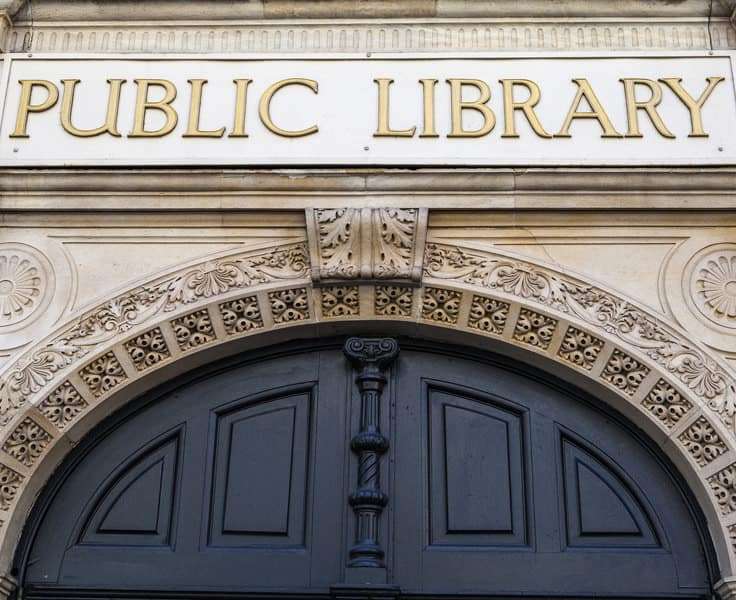Biblio TECH: Why Libraries Matter More Than Ever in the Age of Google by John Palfrey
What's It About?
For many of us, libraries are magic.We treasure the feeling when we walk through the door that we’ve entered someplace awesome, the thrill of the hunt through the catalog for exactly what we’re looking for, the wonder of discovering new titles, and the rush of joy we experience when we see the book that we want waiting for us on the shelf.
What’s to become of libraries now that the sum total of human knowledge is literally in the palm of our hands? What will happen to libraries when virtually every book, every image, every piece of music ever produced is available instantly in our homes at the touch of a keyboard?
 Don’t despair. Not only is there still a place for the library in the modern age, but libraries are just as important now as they’ve ever been. So says John Palfrey, Head of School at Phillips Academy and author of Biblio TECH: Why Libraries Matter More Than Ever in the Age of Google (Basic Books, 2015).
Don’t despair. Not only is there still a place for the library in the modern age, but libraries are just as important now as they’ve ever been. So says John Palfrey, Head of School at Phillips Academy and author of Biblio TECH: Why Libraries Matter More Than Ever in the Age of Google (Basic Books, 2015).
“Libraries are more than community centers, just as librarians do more than answer questions you could easily ask Google,” writes Palfrey. “From the opening of the Boston Public Library, the first public library, to the expansion of libraries across America . . . the library as an institution has been fundamental to the success of our democracy.
“Libraries provide access to the skills and knowledge necessary to fulfill our roles as active citizens,” Palfrey continues. “Libraries also function as essential equalizing institutions in our society.”
Lisa Oldham, director of the New Canaan Public Library in Connecticut, agrees. “The traditional mission of public libraries is to serve the learning needs of the complete diversity of their constituency, from cradle to grave, from indigent to millionaire, from barely literate to academic.”
And the American public agrees as well. According to a recent poll from the Pew research center, more than 90 percent of Americans believe that public libraries are a vital part of their communities.
But how can libraries continue to do that in a time of e-books and Wikipedia? Libraries must adapt to technological changes and include them as part of their offerings to their patrons. And libraries must move rapidly, says Oldham, “incorporating new technology as quickly as possible to serve [communities’] vital needs while also retaining older, analogue formats for those who prefer them.”
“The path forward for libraries and librarians is not mysterious,” Palfrey writes. “The key is very simple: to focus on what the digital media and the Internet make possible, not what they undo. This perspective enables library supporters to find and exploit the ways in which the digital and the analog come together, where they reinforce on another.”
The potential for libraries in the digital world is endless. For starters, they provide free access to computers and the Internet to anyone who needs them, regardless of income or background. Beyond that, librarians can help patrons navigate the vast and expansive digital frontier. For example, librarians can help patrons find, at no cost, “interactive materials ranging from original historical documents to the notes from recent city hall meetings,” Palfrey writes. Libraries and librarians remain essential for “helping other people make sense of the overwhelming mass of information online—and making it immediately relevant to their lives.”
The adaptation of technology won’t be easy, though, in a time of dwindling financial support from local, state and the federal government. It will be largely up to us, those who love libraries, to help successfully usher them into a digital age. “Support for libraries, both financial and otherwise, is crucial during this period of transformation from a predominantly analog to a predominantly digital world,” Palfrey writes. “Our job now as citizens and library patrons is to support them in their efforts so they can fulfill their essential role in our communities.
“Physical libraries have never been more vital, interesting, useful places,” says Palfrey. “If we don’t maintain physical libraries, we will lose essential public, intellectual spaces in our communities, places where people can meet face-to-face, and if we don’t build digital libraries connected to them, those physical places may become obsolete.”
Buy this Book!
Amazon





